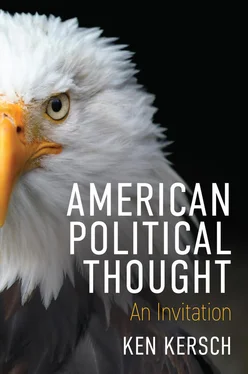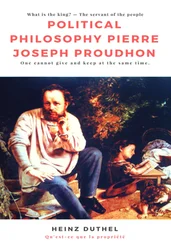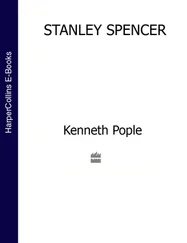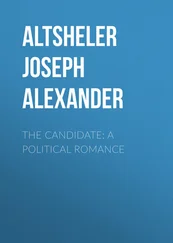In studying political thought, we ask fundamental positive and normative questions about how power (positive) and authority (normative) has been wielded, exercised, and justified within politics generally – the more abstract study of “political theory” or “political philosophy” – and within particular political communities, that is, within a given polis or polity. The study of American political thought is the study of how political power and authority have been both wielded and justified within the United States over the length and breadth of its history. Undertaking such study invites both more general and abstract “universal” questions of political theory and thought, and more “particularistic” questions about the political power and authority within a single, delimited political community, in a world comprised of many, and diverse, political communities, with both overlapping and disparate approaches to the same foundational political questions.
While quotidian contention over who gets to tell whom what to do is as old as human society itself, the public raising of hard and sustained questions about the legitimacy of the social and political order was once rare. To do so (if it even occurred to people) was considered not only presumptuous and hubristic, but also potentially destabilizing, if not subversive: it was dangerous. In almost all human societies, longstanding, deeply rooted, and entrenched assumptions about who gets to tell you what to do pervaded the community. The question was rarely raised in part because, within the community, that answer – whatever it was – was taken to be obvious: what always had been, and what forever will be. Among the most common of these answers were God or the Gods; those chosen by the Gods as their earthly agents (clerics and an ecclesiastical hierarchy; monarchs chosen by divine right); tribal elders; parents; or your lord, master, or owner. The matter of who gets to tell you what to do was decided by presumptively eternal, natural, or divinely ordained hierarchies. In the western political tradition, the animating assumption of these hierarchies setting the relationship between rulers and ruled was that the higher and better rightfully commanded the lower and lesser. To subject these hierarchies to questioning, and to imagine a menu of alternative possibilities, was the beginning of political philosophy. One of the first men to devote his life to political philosophy and to teaching it to the young, the ancient Athenian Socrates, it is worth recalling, was put to death. The charge was the corruption of the city’s youth and the (dangerous and destabilizing) challenging of its Gods.
Do nations like the United States have shared and pervading political philosophies? My own view, as reflected in this book, is that – in complicated ways, to be sure – they do. But there is a pre-history, and context, even to that. Modern nation-states like the US are just one type of polity, and a relatively new one at that. Families, tribes, cities, city-states, and even churches set the rules of group life within a community long before modern “sovereign” nations were imagined. The modern nation first emerged as a distinctive type of polity in seventeenth-century Europe. By that time, under the pressures of economic transformation and a Renaissance humanism fueled in significant part by the rediscovery of ancient Greek and Roman political thought, the political authority structure of medieval Europe had decayed and declined. In medieval Europe, worldly political and religious ecclesiastical authority were extensively intertwined. While disputes sometimes arose, political authority, it was nevertheless said, ran from God to his Church – and, as such, to his appointed agent on earth, the Pope, who sat at the pinnacle of the Christian (Roman Catholic) Church’s clerical hierarchy. As God’s divinely chosen agent, the Pope’s authority extended downward both within and without the Church. In the latter realm, it extended downward to monarchs – Kings and Queens – held to rule by “divine right.” Under the feudal system, that hierarchical line of authority extended downward from the monarch to his or her Lords and Nobles, to their vassals and serfs. Under a feudal political order, the lines of authority concerning who got to tell whom what to do were clearly defined, running vertically from top to bottom. These lines of authority were understood to be not only the reality, but rightful.
The dawn of modernity, which was characterized by a new focus on men as unique, worldly, self-determining agents, was reflected in, and driven by, a series of revolutionary new departures: the invention of the printing press (c. 1440); the (Protestant) Reformation (c. 1517–1648) and, relatedly, the first translations of the Bible into vernacular languages, the Protestant elevation of the laity above the clergy, and the democratization of church structures. The new humanism, an incipient capitalism, and Protestantism generated a cascade of disputes that repeatedly raised more persistent questions about who gets to tell whom what to do, challenging in a more substantial and systematic way society’s long-settled hierarchies. Europe’s monarchs began to push back against the commands and dictates of the Pope. Feudal lords and nobles pushed back in a more pervasive way against the political power and authority of the monarchs. Vassals, serfs, and peasants began pushing back more vehemently and insistently against the authority of their Lords and masters.
As the feudal order unraveled at the dawn of modernity, a sense of crisis descended concerning the legitimacy of the full array of claims to authority. New, “modern” or “liberal” theories of the origins of political authority – of who gets to tell you what to do – emerged out of this crisis. These theories were forged with the aim of reconstructing some sense of legitimate, rightful authority that would underwrite a workable political order in a context of spiraling chaos, occasioning a succession of wars, rebellions, and acts of insolent disobedience. In time, “modern” political theorists like Thomas Hobbes, John Locke, and Jean-Jacques Rousseau alighted upon a new – and revolutionary – social contract theory of political authority, which emerged in conjunction with new understandings of sovereignty and nationhood. Who got to tell you what to do? The authorized ruler of your (geographically bounded and delimited) nation. Who was the foundational and authorized ruler of your nation? The sovereign (which, for some radical theorists, was constituted by the people as a whole).
With moderns chafing at hierarchies underwritten by the understanding that the stronger, the better, or the powers-that-be from time immemorial got to tell them what to do, a new group of political theories began with what, under conditions of dissension and disagreement concerning first principles, they assumed would be the least controversial starting point promising the broadest common ground. They proposed that each individual person (answering to his own understanding of God’s commands) got to tell himself what to do (the “his” here is deliberate: gender played a major role in structuring the public realm). Modern political theorists asked next, “Under what conditions would this person delegate the authority to tell himself what to do to someone other than himself?” The answer was: “Under conditions in which that person could help them get something that they needed or wanted but could not otherwise get if sovereignty were held only to reside in their lowly selves – all equals in the state of nature – and no higher.” In Leviathan (1651), the English political theorist Thomas Hobbes described the state of nature as a condition in which
there is no place for industry, because the fruit thereof is uncertain, and consequently no culture of the earth, no navigation nor use of the commodities that may be imported by sea, no commodious building, no instruments of moving and removing such things as require much force, no knowledge of the face of the earth; no account of time, no arts, no letters, no society, and, which is worst of all, continual fear and danger of violent death, and the life of man solitary, poor, nasty, brutish, and short.
Читать дальше












